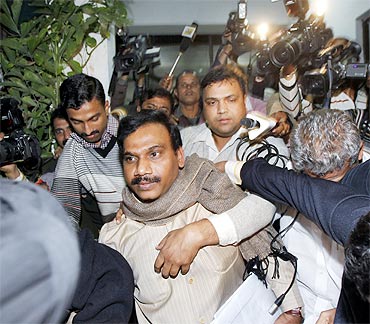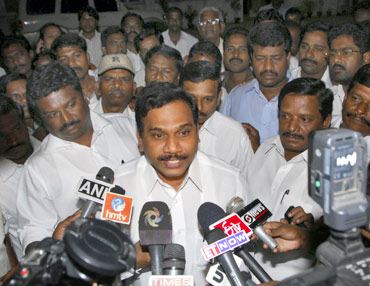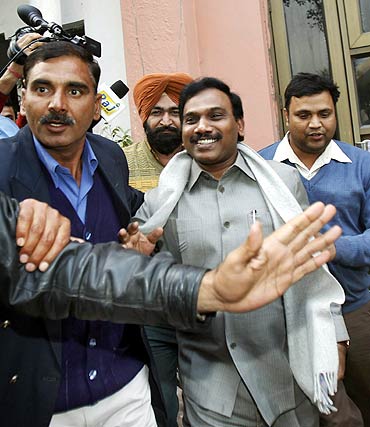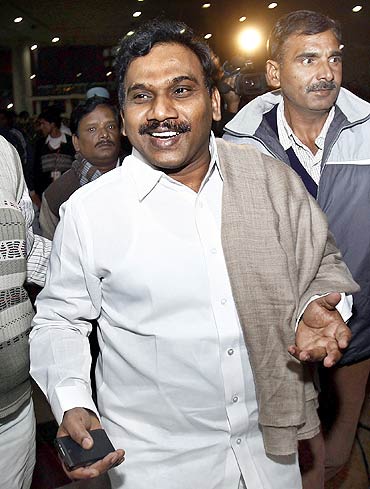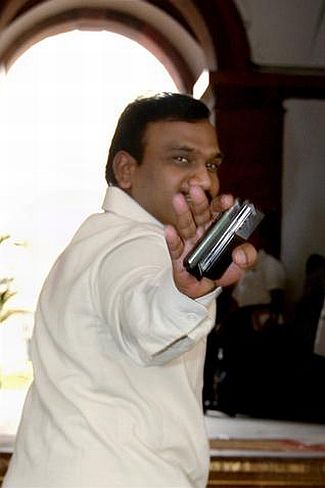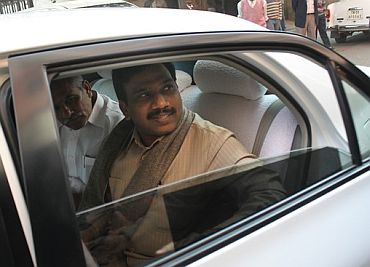 | « Back to article | Print this article |
CBI arrests A Raja in 2G Spectrum scandal
Andimuthu Raja, who as Telecom Minister had allegedly manipulated procedures in allocation of 2G Spectrum that has dented UPA government's image, was arrested on Wednesday along with two officials by the Central Bureau of Investigation, a week before it has to file its final investigation report in the Supreme Court.
Retired bureaucrat, Siddartha Behura, who was Telecom Secretary in 2008 when the controversial decision to give licenses was taken, and Raja's Personal Secretary R K Chandolia were also arrested with the former Minister, all of whom were called to the CBI headquarters this morning.
"Based on the facts disclosed so far during the investigations regarding their role in allocation of Letter of Intent and resultant Unified Access Services Licenses and Spectrum to certain companies ahead of others, the CBI has today arrested the then Telecom Minister, the then Telecom Secretary, the then Private Secretary to the Minister," a brief statement issued by the CBI said.
Please click NEXT to read further...
CBI arrests A Raja in 2G Spectrum scandal
It recalled that it had earlier registered a case under various sections of IPC and Prevention of Corruption Act against unknown officials of DoT, persons and companies on the allegation of conspiracy and abuse of official position in order to give pecuniary advantage or favour to the applicant companies in the processing and allocation of letters of intent for UAS Licences and resultant spectrum allocation to launch telecom services.
Behura belonged to the IAS while Chandolia is still serving in the Indian Economic Service.
The arrest of 47-year-old Raja, the Dalit face of the Dravida Munnetra Kazhagam, a crucial ally of the Congress at the Centre, comes almost two months after his resignation as minister in the wake of a Parliamentary storm over his continuance and Supreme Court breathing down the government's neck on investigations in the scam.
CBI arrests A Raja in 2G Spectrum scandal
The 2G scam paralysed the entire winter session of Parliament on opposition's demand for a Joint Parliamentary Committee (JPC) probe to go into it. Unless a way is found on the issue, the forthcoming Budget session could again be in trouble.
CBI sources said that the decision to arrest Raja was taken after one of those questioned by it had reportedly given details of some financial transactions of the former minister between 2007, when the process for giving the new licences began, and January, 2008 when the actual licences were given.
They said the person who had 'spilled the beans' could be made an approver during the trial.
Raja, a lawyer and five-time MP, was forced to resign in November last after embarrassing details of the Comptroller and Auditor General of India's report of a presumptive loss of Rs 1.76 lakh crore to the exchequer in the allocation of Spectrum in 2007-08 became public.
CBI arrests A Raja in 2G Spectrum scandal
The arrest also comes two days after DMK Chief M Karunanidhi held discussions with Congress President Sonia Gandhi and Prime Minister Manmohan Singh to firm up the alliance between the two parties for the coming assembly elections in Tamil Nadu.
Both the parties have ruled out Raja's arrest having any impact on the political tie up between the two parties. "What has happened is law taking its course and it has nothing to do with the political alliance," Congress spokesperson Abhishek Singhvi told reporters at the daily AICC briefing.
However, the opposition parties are unimpressed with the CBI action describing it as "too little, too late" facing the Supreme Court deadline and made it clear that they would not back out from their demand for constitution of a Joint Parliamentary Committee (JPC) to go into scam.
DMK's arch rival All India Anna Dravida Munnetra Kazhagam went a step further and demanded the arrest of corporate lobbyist Niira Radia and family members of Karunanidhi who had conversations with Radia. Party chief Jayalalithaa said the arrest was well-timed for the elections.
CBI arrests A Raja in 2G Spectrum scandal
The CBI had filed a case against unknown officials of Department of Telecom in October 2009 and conducted searches in the Ministry but focused on Raja only after his resignation. He has been questioned three times beginning December 24, 2010.
In its FIR, CBI mentioned the loss in spectrum allocation as Rs 22,000 crore based on CVC findings which had referred the case to it.
Searches were conducted at his residence in the national capital and in Perambalur in Tamil Nadu and in the houses of a number of associates and relatives.
Allegations against Raja and his associates include abuse of their official position and manipulating the tendering process by advancing cut off dates, asking licencees to deposit the fee within one week and introducing an arbitrary first-come-first-serve basis principle to award licenses benefiting some firms.
CBI arrests A Raja in 2G Spectrum scandal
Raja was questioned by the CBI about the alleged funding of some front organisations owned by Telecom companies, which had been allocated spectrum from October 2007 to January 2008, official sources said.
The DMK MP had been confronted with some questions and documents recovered from the computers seized during searches conducted by the investigation agency earlier at his premises, the sources said.
He was also asked about his conversations with corporate lobbyist Niira Radia and the reasons for advancing the cut-off date of applying for license for spectrum allocation in 2007 by a week.
CBI arrests A Raja in 2G Spectrum scandal
Raja was forced to resign on November 14 last year in the wake of the CAG report which held that the spectrum allocation at undervalued prices resulted in a notional loss of Rs 1.76 lakh crore to the state exchequer.
He got the telecom portfolio on May 18, 2007 and was and was given the charge of the same ministry after the 2009 general elections. He resigned on November 14, 2010.
The Supreme Court has asked CBI and Enforcement Directorate to submit status reports on their investigations into the 2G spectrum case to it by February 10 when the case will come up for further hearing.
CBI has also questioned former Telecom Regulatory Authority of India (TRAI) chief Pradip Baijal, a 1966 batch IAS officer of Madhya Pradesh cadre, and former Telecom Secretary D S Mathur in connection with the case.
